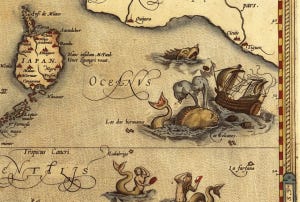Here Be Dragons
“Here be dragons.” This phrase appears on one map from 1504 to denote dangerous and unknown territory. Other maps, while not using this phrase, depict pictures of sea monsters and dangerous creatures, both known and unknown, to warn the adventurers and travelers that they are entering unmapped territory. Some even used the phrase “here be lions.”
Venturing into unknown territory is scary, isn’t it? We like to be where we know and are known. There is even something special about returning to a rock upon which you like to sit or seeing a landmark that makes you feel safe. As a child, I mapped out several of these landmarks on our farm in Spring Garden, Alabama, and this past Christmas I was able to revisit them and feel that same sense of comfort and security I did as a child. My friend Aram and I were talking one day, and he said, “There’s this tree I know…”
When we visit an unknown place, our heart rate increases, our senses our heightened, and we wait with anticipation for the beauty, the danger, or, as my fellow hikers know, the ridiculous, calf-burning climb that awaits us.
Faith can be like this too, can’t it?
When we read our Bibles cover to cover, or perhaps just one book, there are times when we feel like we are venturing into the unknown. I remember my first time studying through and preaching the book of Daniel. As I went verse by verse and chapter by chapter, the detailed prophecies were daunting, but occasionally I would happen upon a familiar story of the Hebrew children or Daniel in the lion’s den. These stories were like a desert oasis; they gave me a break from the rigorous study the other chapters required.
But seasons of change are also like this. As we grow older and mature in our faith, we realize that we have to unlearn things as we learn new truths. We may also have to give up old habits in exchange for new ones.
This process of death and resurrection is difficult for anyone. The apostle Paul explained how his evolving relationship with the law was like being crucified with Christ. Paul, who told the church at Corinth that he died daily, wrote of his struggle to the Philippians,
“Yet whatever gains I had, these I have come to regard as loss because of Christ. More than that, I regard everything as loss because of the surpassing value of knowing Christ Jesus my Lord. For his sake I have suffered the loss of all things, and I regard them as rubbish, in order that I may gain Christ and be found in him, not having a righteousness of my own that comes from the law but one that comes through faith in Christ, the righteousness from God based on faith. I want to know Christ and the power of his resurrection and the sharing of his sufferings by becoming like him in his death, if somehow I may attain the resurrection from the dead” (Philippians 3:7–11).
There have been times in my own faith journey that I have wanted to run away from what I was seeing. I knew that changing my mind, or perhaps a better way of putting this would be consenting to the transforming power of the Spirit, would have disastrous consequences because there was not much flexibility in my heritage. But as I stand on this side looking back, I have a kind of freedom and peace that I never knew was possible. There aren’t any dragons here. The waters are safe. The land is plentiful. And it keeps getting better!



